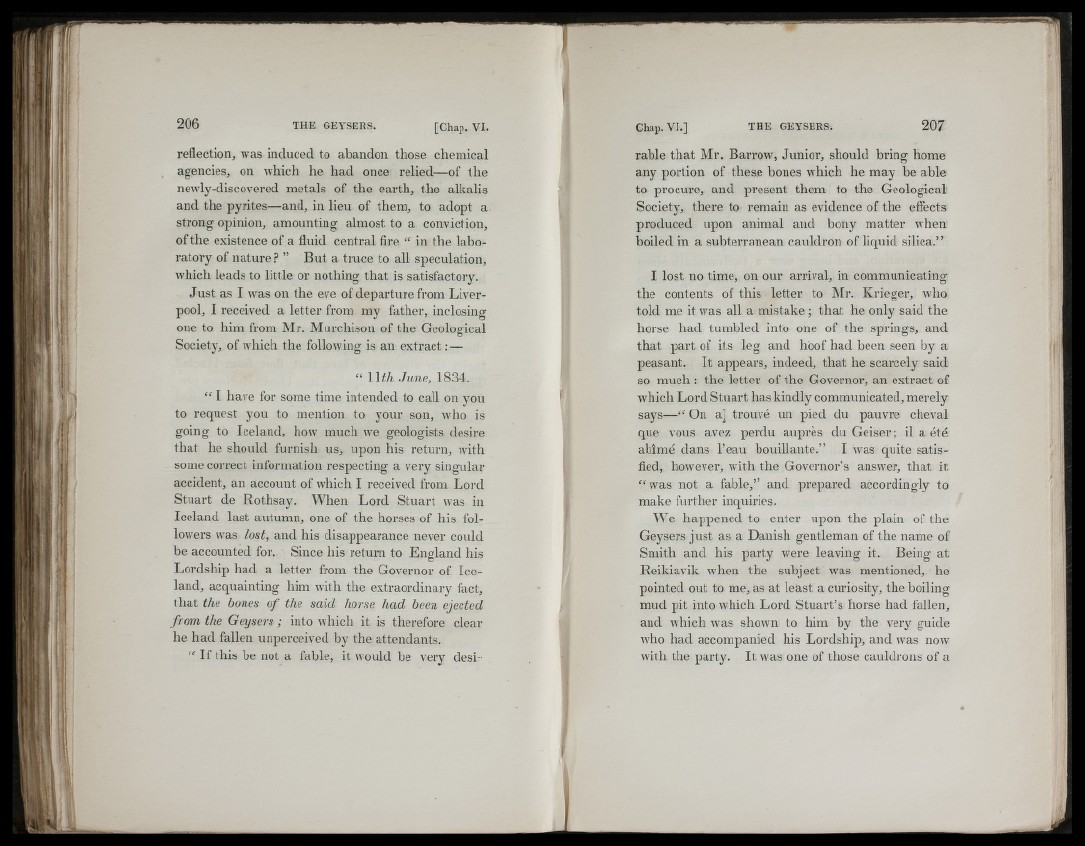
I
-Ll £11,.
m
V
f
4:'
•{
reflection, was induced to abandon those chemical
agencies, on which he had once relied—of the
newly-discovered metals of the earth, the alkalis
and the pyrites—and, in lieu of them, to adopt a
strong opinion, amounting almost to a conviction,
of the existence of a fluid central fire “ in the laboratory
of nature .? ” But a truce to all speculation,
which leads to little or nothing that is satisfactory.
Just as 1 was on the eve of departure from Liverpool,
1 received a letter from my father, inclosing
one to him from Mr. Murchison of the Geoloogical
Society, of which the following is an extract: —
“ l l t h June, 1834.
“ 1 have for some time intended to call on you
to request you to mention to your son, who is
going to Iceland, how much we geologists desire
that he should furnish us, upon his return, with
some correct information respecting a very singular
accident, an account of which I received from Lord
Stuart de Rothsay. When Lord Stuart was in
Iceland last autumn, one of the horses of his followers
was lost, and his disappearance never cmdd
be accounted for. Since his return to England his
Lordship had a letter from the Governor of Iceland,
acquainting him with the extraordinary fact,
that the bones o f the said horse had been ejected
from the Geysers ; into which it is therefore clear
he had fallen unperceived by the attendants.
“ If this be not a fable, it would be very desi-■
rahle th a t Mr. Barrow, Junior, should bring home
any portion of these bones which he may be able
to procure, and present them to the Geological
Society, there to remain as evidence of the eflfects
produced upon animal and bony matter when
boiled in a subterranean cauldron of liquid silica.”
1 lost no time, on our arrival, in communicating
the contents of this letter to Mr. Krieger, who
told me it was all a mistake ; th a t he only said the
horse had tumbled into one of the springs, and
that part of its leg and hoof had been seen by a
peasant. It appears, indeed, that he scarcely said
so much : the letter of the Governor, an extract of
which Lord Stuart has kindly communicated, merely
says—“ On a] trouvfe un pied du pauvre cheval
que vous avez perdu auprès du Geiser; il a été
abîmé dans l’eau bouillante.” 1 was quite satisfied,
however, with the Governor’s answer, that it
“ was not a fable,” and prepared accordingly to
make further inquiries.
We happened to enter upon the plain of the
Geysers just as a Danish gentleman of the name of
Smith and his party were leaving it. Being at
Reikiavik when the subject was mentioned, he
pointed out to me, as at least a curiosity, the boiling
mud pit into which Lord Stuart’s horse had fallen,
and which was shown to him by the very guide
Avho had accompanied his Lordship, and was now
with the party. I t was one of those cauldrons of a